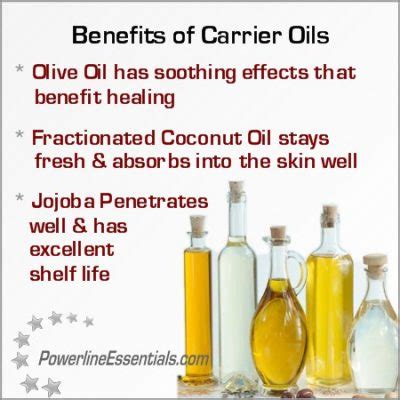Carrier oils act as a base for essential oils. They’re used to dilute the essential oils before applying them to the skin, and they can also help to improve the absorption of the essential oils.

Carrier oils are typically made from plant-based oils, such as jojoba oil, coconut oil, or avocado oil. They’re chosen for their ability to penetrate the skin and their lack of comedogenic properties, meaning they won’t clog pores.
Carrier oils can be used for a variety of purposes, including:
- diluting essential oils for topical application
- creating massage oils
- making homemade skincare products
- adding to baths
When choosing a carrier oil, it’s important to consider your skin type and the purpose of the oil. For example, jojoba oil is a good choice for oily or acne-prone skin, while coconut oil is a good choice for dry or sensitive skin.
There are many different types of carrier oils available, each with its own unique properties. Some of the most popular carrier oils include:
- Jojoba oil: Jojoba oil is a plant-based oil that is very similar to the sebum produced by the skin. It is non-comedogenic, making it a good choice for oily or acne-prone skin. Jojoba oil is also hypoallergenic and has anti-inflammatory properties.
- Coconut oil: Coconut oil is a saturated fat that is solid at room temperature. It is a good choice for dry or sensitive skin, as it is very moisturizing. Coconut oil also has antibacterial and antifungal properties.
- Avocado oil: Avocado oil is a rich, emollient oil that is high in vitamins A, D, and E. It is a good choice for dry or mature skin, as it can help to hydrate and nourish the skin. Avocado oil also has anti-inflammatory properties.
- Sweet almond oil: Sweet almond oil is a light, non-comedogenic oil that is a good choice for all skin types. It is high in vitamin E and has emollient properties. Sweet almond oil can also help to improve the absorption of essential oils.
- Grapeseed oil: Grapeseed oil is a light, non-comedogenic oil that is high in antioxidants. It is a good choice for oily or acne-prone skin, as it can help to reduce inflammation and protect the skin from damage.
There are many benefits to using carrier oils, including:
- They help to dilute essential oils. Essential oils are highly concentrated and can be irritating to the skin if they are applied undiluted. Carrier oils help to dilute the essential oils and make them more gentle on the skin.
- They help to improve the absorption of essential oils. Carrier oils can help to improve the absorption of essential oils into the skin. This is because carrier oils are able to penetrate the skin more easily than essential oils.
- They can help to moisturize the skin. Carrier oils are rich in nutrients that can help to moisturize and nourish the skin. This is especially beneficial for dry or mature skin.
- They can help to improve the appearance of the skin. Carrier oils can help to improve the appearance of the skin by reducing inflammation, protecting the skin from damage, and moisturizing the skin.
Carrier oils can be used in a variety of ways, including:
- Diluting essential oils: To dilute essential oils for topical application, add 2-3 drops of essential oil to 1 tablespoon of carrier oil.
- Creating massage oils: To create a massage oil, add 10-15 drops of essential oil to 1 ounce of carrier oil.
- Making homemade skincare products: Carrier oils can be used to make a variety of homemade skincare products, such as lotions, creams, and serums.
- Adding to baths: To add carrier oils to a bath, add 1/2 cup of carrier oil to the bathwater.
Here are a few tips and tricks for using carrier oils:
- Choose the right carrier oil for your skin type. Different carrier oils have different properties, so it’s important to choose the right carrier oil for your skin type.
- Start with a small amount. When using carrier oils for the first time, start with a small amount and gradually increase the amount as needed.
- Do a patch test. Before using a carrier oil on a large area of skin, do a patch test on a small area of skin to make sure you don’t have any allergic reactions.
- Store carrier oils properly. Carrier oils should be stored in a cool, dark place.
Here are a few common mistakes to avoid when using carrier oils:
- Using too much carrier oil. Using too much carrier oil can make the essential oil less effective.
- Using the wrong carrier oil for your skin type. Using the wrong carrier oil for your skin type can lead to irritation or breakouts.
- Not doing a patch test. Not doing a patch test can lead to allergic reactions.
- Storing carrier oils improperly. Storing carrier oils improperly can reduce their shelf life.
Here are some frequently asked questions about carrier oils:
- What is the best carrier oil for essential oils? The best carrier oil for essential oils depends on your skin type and the purpose of the oil.
- Can I use carrier oils on my face? Yes, carrier oils can be used on the face. However, it’s important to choose a carrier oil that is non-comedogenic, such as jojoba oil or grapeseed oil.
- How long do carrier oils last? Carrier oils typically have a shelf life of 6-12 months.
- Can I use carrier oils if I have sensitive skin? Yes, carrier oils can be used on sensitive skin. However, it’s important to do a patch test before using a carrier oil on a large area of skin.
Carrier oils are a versatile and beneficial addition to any essential oil collection. They can be used to dilute essential oils, create massage oils, make homemade skincare products, and add to baths. When choosing a carrier oil, it’s important to consider your skin type and the purpose of the oil.
